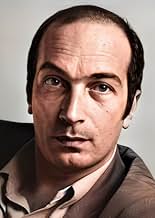CALIFICACIÓN DE IMDb
7.7/10
7.4 k
TU CALIFICACIÓN
El machista Alexandre equilibra las relaciones con varias mujeres, incluida la maternal Marie y la libertina Veronika, en la escena intelectual del París posterior a 1968.El machista Alexandre equilibra las relaciones con varias mujeres, incluida la maternal Marie y la libertina Veronika, en la escena intelectual del París posterior a 1968.El machista Alexandre equilibra las relaciones con varias mujeres, incluida la maternal Marie y la libertina Veronika, en la escena intelectual del París posterior a 1968.
- Dirección
- Guionista
- Elenco
- Premios
- 3 premios ganados y 1 nominación en total
Jean-Claude Biette
- Un homme aux Deux Magots
- (sin créditos)
Jean Douchet
- Un homme au Café de Flore
- (sin créditos)
Bernard Eisenschitz
- Maurice
- (sin créditos)
Jean Eustache
- Le mari de Gilberte
- (sin créditos)
- …
Noël Simsolo
- Un homme au Café de Flore
- (sin créditos)
- Dirección
- Guionista
- Todo el elenco y el equipo
- Producción, taquilla y más en IMDbPro
Opiniones destacadas
... is because of films like this.
Don't get me wrong. I like independent cinema, and particularly like good foreign films, but this film could have been cut by at least an hour.
I'll explain.
The film revolves around a self centered young man who professes he loves certain women, but is really looking for someone to love him. Enter a woman who doesn't love herself, but finds this same young man, taps his energy, and both wind up "flowering" for it.
This movie revolves around the sexual morays and politics of a small group of Parisians. The film starts out very strong. Actors present characters in an extended first act that we would like to get to know, but, unfortunately this pic becomes the poster boy for the proverbial "long boring French film" replete with characters who light up cigarettes and talk in either cafés or materially spartan rented rooms about how life should be different, and what it all means. Toss in an Oedipal complex/undercurrent, and you have the quintessential French avante-garde flick.
Huh.
Inspite of this there's some good material in this film, but director Jean Eustache (probably to make up for lack of scheduling and some technical aspects) throws a lot of dialog at the audience that would've have been better served with some visual cues.
All in all it shows how messed up an certain sect of French culture really is, and, perhaps ironically, drives home a realist message regarding the act of coupling.
Technically it's bare bones. Lots of natural lighting is fused with high contrast B&W cinematography, and to add to the rugged feel of the film the scratch track is used. Little to no looping of dialog. You can hear what pros call "room tone" as it was actually recorded during filming.
I could go off the deep end and call this film self-indulgent, pretentious et al, but will say instead that the exposition given to the story was "over-exposed" (for lack of a better term). The symbolism is fine, but a lack of visuals and a borderline in-you-face delivery of certain dialog, hampers what could have been a much better film. By that I don't mean commercially successful nor accessible, but a film that could have delivered the same gists, character and message without the flaunting its strive for artistic excellence.
Don't get me wrong. I like independent cinema, and particularly like good foreign films, but this film could have been cut by at least an hour.
I'll explain.
The film revolves around a self centered young man who professes he loves certain women, but is really looking for someone to love him. Enter a woman who doesn't love herself, but finds this same young man, taps his energy, and both wind up "flowering" for it.
This movie revolves around the sexual morays and politics of a small group of Parisians. The film starts out very strong. Actors present characters in an extended first act that we would like to get to know, but, unfortunately this pic becomes the poster boy for the proverbial "long boring French film" replete with characters who light up cigarettes and talk in either cafés or materially spartan rented rooms about how life should be different, and what it all means. Toss in an Oedipal complex/undercurrent, and you have the quintessential French avante-garde flick.
Huh.
Inspite of this there's some good material in this film, but director Jean Eustache (probably to make up for lack of scheduling and some technical aspects) throws a lot of dialog at the audience that would've have been better served with some visual cues.
All in all it shows how messed up an certain sect of French culture really is, and, perhaps ironically, drives home a realist message regarding the act of coupling.
Technically it's bare bones. Lots of natural lighting is fused with high contrast B&W cinematography, and to add to the rugged feel of the film the scratch track is used. Little to no looping of dialog. You can hear what pros call "room tone" as it was actually recorded during filming.
I could go off the deep end and call this film self-indulgent, pretentious et al, but will say instead that the exposition given to the story was "over-exposed" (for lack of a better term). The symbolism is fine, but a lack of visuals and a borderline in-you-face delivery of certain dialog, hampers what could have been a much better film. By that I don't mean commercially successful nor accessible, but a film that could have delivered the same gists, character and message without the flaunting its strive for artistic excellence.
I put off reviewing it for quite a while; I just couldn't come to terms with its rejection of the New Wave. Eustache has given us the talkiest movie ever, if you except those marathon Rivette films from the same period (I survived a showing of Out One: Spectre).
The camera doesn't move: it is parked in front of the actors in cafes and restaurants. The close camera placement forces us to concentrate on the conversations, which are monologues by Alexandre interspersed with explosions from Veronika. The romantic word-spinning from Alexandre is of this ilk: "The day I stop suffering, I'll have become someone else," or "In May 1968 a whole cafe was crying. It was beautiful. A tear gas bomb had exploded... a crack in reality had opened up," or most poetically, "I don't do anything, I let time do it." The retorts from Veronika are sometimes astonishing in their savagery: "Watch out, you'll push in my Tampax."; "I've screwed the maximum of Jews and Arabs."; (serving tea)"I like the feel of a prick against my ass, even if it's soft. One sugar or two?" It's as if a Proust character somehow left his drawing room to go slumming with a woman out of L-F Celine's Death on the Installment Plan.
This film ought to be seen by anyone interested in French film of that period--the 70's--but be aware of the static, slow-moving nature of the work.
The camera doesn't move: it is parked in front of the actors in cafes and restaurants. The close camera placement forces us to concentrate on the conversations, which are monologues by Alexandre interspersed with explosions from Veronika. The romantic word-spinning from Alexandre is of this ilk: "The day I stop suffering, I'll have become someone else," or "In May 1968 a whole cafe was crying. It was beautiful. A tear gas bomb had exploded... a crack in reality had opened up," or most poetically, "I don't do anything, I let time do it." The retorts from Veronika are sometimes astonishing in their savagery: "Watch out, you'll push in my Tampax."; "I've screwed the maximum of Jews and Arabs."; (serving tea)"I like the feel of a prick against my ass, even if it's soft. One sugar or two?" It's as if a Proust character somehow left his drawing room to go slumming with a woman out of L-F Celine's Death on the Installment Plan.
This film ought to be seen by anyone interested in French film of that period--the 70's--but be aware of the static, slow-moving nature of the work.
One of the last classics of the French New Wave. For direction, cineaste Jean Eustache drew from the simplicity of early-century cinema; for story, Eustache drew on the torments of his own complicated love life. So many things can be said of this film - observationally brilliant; self indulgently overlong; occasionally hilarious; emotionally draining...etc. etc. In my mind, whatever complaints that can be leveled against this film are easily overshadowed by its numerous strengths. Every film student, writer, or simply anyone willing to handle a 3 hour film with no abrupt cuts, no music video overstyling, no soap opera-like plot twists, and no banal dialogue should make it a point to see this movie. Everything is to be admired: the writing (concise, clever, surprisingly funny), acting (everyone, quite simply, is perfect in their respective roles), and, simple direction (the viewer feels like a casual observer within the film) make this film unforgettable. This is undoubtedly a film that stays with you.
This is a wonderful film. My personal second best film of all time. ("Les Mepris" by Jean -Luc Goddard being the first.) La Maman et La Putain is beautiful in its evocation of the complicated emotions that arise in loving and / or sexual relationships. Jean Eustache is a man I would have liked to have had a chat with. He was an intelligent observer of l'etat humaine.No daftie. This film was made over thirty years ago but to me is contemporary in the manner in which it discusses the eternal themes of human interaction. The monolgue by the character Veronika is sheer brilliance..in acting and writing...this particular scene is cinema or drama at its best. Never seen anything to compete with it in the cinema yet. Thoroughly recommend this film. Three and a half hours. So?
10hasosch
Unfortunately, Jean Eustache (1938-1981) belongs like so many once leading French film makers nowadays to the great unknown ones whose movies are hard to find and are not released on international DVDs. Since we have a good old-fashioned video-store in Tucson, I had the chance to watch this 3 1/2-hour marathon masterwork that is not boring for ten seconds.
Since we speak here about one of the most discussed (and most controversially discussed) movies of all times, let me tell you my impression that the endless dialogs, originally typical for the early "Nouvelle Vague" of a Jacques Rivette or Alain Resnais appear almost ridiculous in this movie. The dialogs are basically monologues, mainly the longest ones spoken by Jean-Pierre Léaud. The most characteristic feature is that the intersections of the speeches of two people is almost zero. Léaud, or his character, Alexandre, pleases to tell more about himself than about the topics he is seemingly to speak. Therefore, one can hardly speak about communication in this movie. It is well possible that the director had a gargantuan satire in mind against the idle running of the once so hotly discussed political and sociological ideas, but the type of man Alexandre exists to all times, we find him already in Petron's "Satiricon", which work has actually great resemblance with "The Mother and the Whore".
Alexandre does not only nothing, but he has developed an own kind of metaphysics about the absence of acting, at least acting in the sense of responsibility toward the society whose part he is. He mocks at the people who run to work at 7 c'clock in the morning, when he is just busy having his last drink before he goes to bed in the apartment of one of his girlfriends from whose money he lives. He is unable to speak one sentence without quoting one of the leading thinkers between Nietzsche and Bernanos. Especially Sartre who is shown quickly in the French intellectual café "Aux Deux Magots", where Alexandre, too, is sitting all day, must serve as excuse for the life-style of Alexandre and his colleagues, because they suffer existential crisis from bourgeois nausea. However, the intellectual speeches of Alexandre seem to be rather pseudo-intellectual, and the sentences and quips he cites seem to come rather from a dictionary of quotations than from his actual reading of the respective books.
It is true: This movie demands an extremely broad European knowledge, especially the connoisseurship of French existentialist philosophy and there consequences to the 68 student revolution movement, but if you have this knowledge, than you will enjoy 215 minutes of your life by staring amazed into the TV and crying out with laughing like you have probably not done it since a long time.
Since we speak here about one of the most discussed (and most controversially discussed) movies of all times, let me tell you my impression that the endless dialogs, originally typical for the early "Nouvelle Vague" of a Jacques Rivette or Alain Resnais appear almost ridiculous in this movie. The dialogs are basically monologues, mainly the longest ones spoken by Jean-Pierre Léaud. The most characteristic feature is that the intersections of the speeches of two people is almost zero. Léaud, or his character, Alexandre, pleases to tell more about himself than about the topics he is seemingly to speak. Therefore, one can hardly speak about communication in this movie. It is well possible that the director had a gargantuan satire in mind against the idle running of the once so hotly discussed political and sociological ideas, but the type of man Alexandre exists to all times, we find him already in Petron's "Satiricon", which work has actually great resemblance with "The Mother and the Whore".
Alexandre does not only nothing, but he has developed an own kind of metaphysics about the absence of acting, at least acting in the sense of responsibility toward the society whose part he is. He mocks at the people who run to work at 7 c'clock in the morning, when he is just busy having his last drink before he goes to bed in the apartment of one of his girlfriends from whose money he lives. He is unable to speak one sentence without quoting one of the leading thinkers between Nietzsche and Bernanos. Especially Sartre who is shown quickly in the French intellectual café "Aux Deux Magots", where Alexandre, too, is sitting all day, must serve as excuse for the life-style of Alexandre and his colleagues, because they suffer existential crisis from bourgeois nausea. However, the intellectual speeches of Alexandre seem to be rather pseudo-intellectual, and the sentences and quips he cites seem to come rather from a dictionary of quotations than from his actual reading of the respective books.
It is true: This movie demands an extremely broad European knowledge, especially the connoisseurship of French existentialist philosophy and there consequences to the 68 student revolution movement, but if you have this knowledge, than you will enjoy 215 minutes of your life by staring amazed into the TV and crying out with laughing like you have probably not done it since a long time.
¿Sabías que…?
- TriviaThis film is based on the real-life relationship between director Jean Eustache and actress Francoise Lebrun (who plays Veronika). The character based on her is named Gilberte in the movie and is played by Isabelle Weingarten.
- ErroresAlexandre can be seen drinking a bottle of 1970 Gevrey-Chambertin, which would have been far too expensive for him to have purchased. This error is illuminated by his notable lack of money during the cafe scene, in which his date pays for his bill.
- ConexionesFeatured in Étoiles et toiles: L'érotisme au cinéma (1983)
- Bandas sonorasIch weiß, es wird einmal ein Wunder gescheh'n
Written by Bruno Balz, Michael Jary and Ralph Benatzky
Performed by Zarah Leander
Selecciones populares
Inicia sesión para calificar y agrega a la lista de videos para obtener recomendaciones personalizadas
- How long is The Mother and the Whore?Con tecnología de Alexa
Detalles
- Fecha de lanzamiento
- País de origen
- Sitios oficiales
- Idioma
- También se conoce como
- The Mother and the Whore
- Locaciones de filmación
- Café Les Deux Magots - 6 place Saint-Germain-des-Prés, Paris 6, París, Francia(Alexandre's usual café)
- Productoras
- Ver más créditos de la compañía en IMDbPro
Taquilla
- Total en EE. UU. y Canadá
- USD 40,555
- Fin de semana de estreno en EE. UU. y Canadá
- USD 5,135
- 25 jun 2023
- Total a nivel mundial
- USD 47,344
- Tiempo de ejecución
- 3h 37min(217 min)
- Color
- Mezcla de sonido
- Relación de aspecto
- 1.37 : 1
Contribuir a esta página
Sugiere una edición o agrega el contenido que falta

























